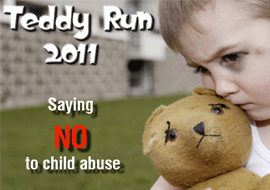



Break the silence
Child sexual abuse is a term that describes a wide variety of abuse. Children can be sexually abused by an adult, adolescent and even a child (child-on-child sexual abuse). Forms of sexual abuse include:
-
Asking or coercing a child to engage in sexual activities
-
Indecent exposure of the genitals to a child
-
Actual sexual contact
-
Physical contact with the child's genitals
-
Viewing of the child's genitalia for the purpose of sexual gratification
-
Using a child to produce pornography
In South Africa, children (boys and girls) under the age of 16 cannot consent to sexual activity.
Childhood sexual abuse has numerous effects that can last well into adulthood if untreated. Some of the most common effects of childhood abuse include depression, post-traumatic stress disorder (PTSD) –more specifically- Rape trauma syndrome, dissociation, anxiety, physical, emotional and social problems.
Most victims know there abuser, either as part of the family- brothers (inter-sibling-abuse), fathers, uncles, cousins or they are acquaintances of the family such as family friends, babysitters, or neighbors. Even though males were described here, women also commit sexual crimes against children. Just as victims are not always female so are the perpetrators not always male.
Long term effects of sexual abuse
Sexual abuse usually has a long term impact on a person if not dealt with. Some physical problems include illnesses such as migraines, pelvic disorders, asthma and problems with sexual organs. Victims usually struggle to trust others and sometimes even oneself. This distrust can be carried into adult relationships which can negatively impact on a marriage. Social skills might be influenced as victims try to isolate themselves in order to prevent future abuse. Sexual intimacy might be a problem along with body image problems where victims try to change the way they look by gaining or losing weight. Sexually abused people have a higher chance of developing PTSD and alcohol and drug problems.
Why victims blame themselves
Victims of sexual abuse have a variety of reasons why they might blame themselves. Young victims might be told by the offender that it is there fault, not to tell anybody as it is there little secret. Offenders can also tell the victim it is there fault for dressing the way they do while others come to the conclusion that they are bad and deserve it on their own.
If the abuse was done by a family member, parents might find it hard to believe the child while other children simply don’t tell and blame themselves if it happens again. Children who are removed from their families due to abuse might blame themselves and even reason that if they kept quiet, they would still be with their family. Some older victims might have experience sensual and sexual pleasure which creates conflicting feelings which might lead to them blaming themselves.
Feelings commonly experience by victims
Victims of sexual abuse experience fear because of the idea that the abuser might return or that the abuser might retaliate against them. Victims might feel that they are different from other people around them; they might fear the future- repeating the pattern- fear the unknown. Without treatment some of these fears can lead to paranoia or cause panic attacks.
Victims often experience depression as a result of loss experienced: loss of oneself, loss of once family, loss of one’s childhood, loss of one’s control over life, loss of a dream...
Anger can be directed at oneself or at those you think should have protected you and at the perpetrator. This anger can lead to disruption in daily life and can place restrictions on the victim. Anger that is not dealt with can cause self-destructive patterns of behavior such as self-mutilation. Anger should be expressed openly in a healthy way.
Many victims experience a loss of control over their lives. Some compensate for this by becoming authoritarian and inflexible. Others might re-enact what happened to them to gain control. Other might become very submissive and choice to be with people who have control over them.
The road to healing
In order to heal, the brain needs to process the trauma that took place. A very effective method used to do this is Multi Level Neuro Processing (MLNP). One of the things that makes abuse and trauma so bad, is the fact that victims feels extremely alone and vulnerable, even just reflecting on the trauma. With MLNP, I will be with you through the process as your brain deals with the trauma. You can heal emotionally from the trauma of abuse. Trauma does influence our brains so ultimately it changes our behaviour and we might loose sight of who we were. Make the choice that your abuser will no longer take from you and empower yourself by dealing with the abuse. If you have been abused or you know someone who is abused, help is available. Don’t lose out on the rest of your life because of what someone stole from you. Seeking help is not a signs of weakness but a sign of strength. It takes courage to work through the abuse, but rest assured, with MLNP you don't have to tell in details what happened to you, making this a very safe way of doing therapy. Break the silence, get help. For more information please contact Victim support on 013 655 5001 or Dr. Nadine Dunn.
* Home * Counselling Services * Trauma Counselling *Marriage Counselling * Mediation * Sexual abuse * Life Coaching * About me * Contact Us
Online booking
Click here to view appointment times and book your appointment online for in-person or online.